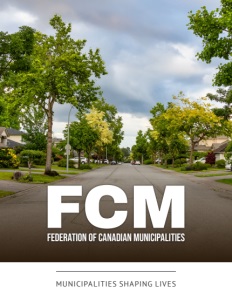Municipalities Shaping Lives
Rebecca Bligh Fights for Municipalities as FCM’s New President
Vancouver City Councillor Rebecca Bligh knows firsthand how municipalities shape the lives of Canadians every day. Since taking office in 2018, she has passionately championed accountability and fiscal responsibility while fostering diverse and inclusive communities that thrive even in tough times. Her dedication led her to join the Federation of Canadian Municipalities (FCM) soon after her victory, where she has now risen to the role of president.
“FCM is at the forefront of tackling urgent local issues like homelessness and affordability, bringing these vital challenges to the national spotlight,” Bligh said.
 “I’m thrilled and honoured to represent municipalities in this way. The common goals and values we share are powerful. At FCM, we are driving meaningful change at the level of government closest to Canadians, and together, we’re making a difference.”
“I’m thrilled and honoured to represent municipalities in this way. The common goals and values we share are powerful. At FCM, we are driving meaningful change at the level of government closest to Canadians, and together, we’re making a difference.”
FCM was established in 1901. The organization now represents over 2,100 municipalities across Canada, encompassing diverse communities from cities to rural areas. The organization is committed to advocating for the needs of municipalities and their residents to the Government of Canada.
However, Bligh added municipalities are expected to achieve more while receiving fewer resources.
“Municipalities are addressing 21st-century challenges with a revenue framework designed in the 19th century,” she said. “It is crucial to update the current funding model. There is strong consensus across all orders of government that this is a challenge we can overcome.”
Municipalities are required by law to maintain a balanced operating budget, meaning they cannot run deficits unlike other orders of government, and they must also manage separate capital and operating budgets.
Despite being tasked with more responsibilities, municipalities rely on limited revenue sources such as property taxes, user fees, and fines. Before the Second World War, they had the authority to impose local income taxes, but this power was revoked in 1941 as part of wartime agreements with the federal government, and it has never been reinstated.
As a result, municipalities depend heavily on property taxes to fund essential services. Although transfers from other orders of government help with capital projects, they do not sufficiently address operational and maintenance costs.
To create a sustainable solution, FCM is proposing a new Municipal Growth Framework. This framework would encourage Canada’s three orders of government to negotiate a fairer distribution of existing taxes. Working Canadians should not have to stretch their budgets beyond their means, and the same principle should apply to municipalities.
The new agreement would enable municipalities to make residents’ lives more affordable, infrastructure more reliable and communities safer.
Despite limited resources, municipalities continue to lead by taking local action on important issues like homelessness, according to Josh Morgan, Mayor of the City of London, ON, and Chair of FCM’s Big City Mayors’ Caucus (BCMC).
“When times are tough, people show their true character,” he said. “Here in London and across the country, municipalities are stepping up to support Canadians. With Canada’s harsh winters, the impact on our most vulnerable populations is severe. As the cost of living rises, more Canadians are being pushed onto the streets. We can only end chronic homelessness by working together.”
Canada is approaching a breaking point. All levels of government must collaborate to address homelessness, which affects an increasing number of Canadians each year. Projections from the Canadian tech company HelpSeeker indicate that if this trend continues, nearly half a million people could become homeless by 2030.
Morgan emphasized that the federal Reaching Home program is a proven initiative that supports vulnerable populations in urban, Indigenous, rural, and remote communities by enabling access to emergency shelters as needed. He expressed concern that, despite receiving additional funding in Budget 2024, municipalities are still awaiting updates on new financial support.
Scott Pearce, Mayor of the Township of Gore, QC, and past president of FCM, noted that many challenges facing larger cities, such as homelessness, affordability, and aging infrastructure, also impact rural and remote communities.
He highlighted that the majority of FCM’s membership consists of rural, remote, or northern areas, which is why FCM is crucial in ensuring that the federal government addresses these issues.
“Living in a small community, I see the unique challenges we face daily,” Pearce said. “Sometimes rural issues get overshadowed by those in Canada’s larger cities, but they are equally important. FCM strives to be a national voice for all cities, towns, villages, and communities across the country.”
In 2001, FCM launched the Rural Forum to ensure that rural communities have a platform for their voices. The forum’s mission is to represent rural interests to the federal government and elevate rural perspectives in national discussions. It includes FCM board members, committee members from rural areas across Canada, and representatives from urban regions with significant rural interests. All presidents of provincial and territorial associations are also part of the forum, allowing them to advocate for their members who may need a direct voice in these discussions.
The forum actively engages with federal leaders to highlight rural priorities, including the quality of rural roads, water infrastructure, public safety and broadband Internet access and cellular service in communities of all sizes. By presenting a united front from rural areas nationwide, it aims to empower rural leaders with the resources necessary to enhance their communities and build a better Canada.
FCM has also been a strong advocate for local climate action and reducing greenhouse gas emissions. Its successful Green Municipal Fund (GMF) has provided funding for sustainable, innovative, and eco-friendly projects nationwide.

Since its inception in 2000, the GMF has significantly reduced Canada’s greenhouse gas emissions by 2.9 million tonnes. The program has funded over 13,000 person-years of employment and supported the development of more than 30,000 sustainable and affordable housing units. Additionally, it has contributed $1.24 billion to the national GDP through over 2,300 approved projects.
GMF oversees approximately $2.4 billion in programs financed by the Government of Canada.
Last year, GMF expanded its mandate to include two new initiatives: the $291-million Growing Canada’s Community Canopies, and the $530-million Local Leadership for Climate Adaptation.
“From coast to coast to coast, FCM works,” Bligh added. “FCM advances the right tools to empower municipalities. With us and your local leaders, you are in good hands to build stronger, more climate-resilient, and safer communities for Canadians.”


